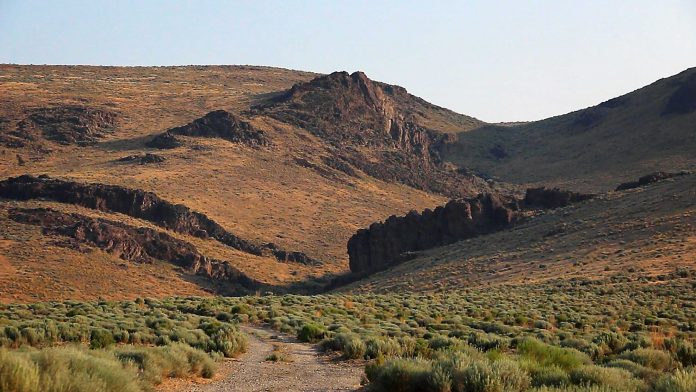
By SCOTT SONNER
Associated Press
RENO, Nev. (AP) — A judge has cleared the way for two tribes to join a legal battle over plans to build a mine in Nevada at the largest known U.S. deposit of lithium and seek a temporary ban on digging for an archaeological survey that they say would desecrate sacred tribal lands near the Oregon line.
U.S. District Judge Miranda Du on Wednesday allowed the Reno-Sparks Indian Colony and Atsa Koodakuh Wyh Nuwu/People of Red Mountain to intervene in a lawsuit against Lithium Nevada Corp.
The tribes say their ancestors were massacred in the late 1800s at the proposed Thacker Pass mine site.
They say the U.S. Bureau of Land Management’s approval of the project in December during the final weeks of the Trump administration violates the National Historic Preservation Act because they haven’t been consulted about potential efforts to mitigate damage to their sacred lands.
If the land agency and “Lithium Nevada prevail, a massive open pit mine will be constructed on a massacre site, historic properties and hunting and gathering grounds important to the region’s tribes,” they wrote in court filings last week on behalf of 1,157 members of the colony including Shoshone, Paiute and Washoe tribes.
It comes after the judge rejected a request last week from four conservation groups that sought to block the digging of sample trenches based on claims it would destroy critical habitat for the sage grouse, an imperiled ground-dwelling bird.
But Du said during a July 21 hearing on that motion that if she decided to allow the tribes to intervene, her initial impression was they had a better chance of persuading her to temporarily halt activity at the mine site.
“The argument about irreparable harm is more persuasive — the violation of the National Historic Preservation Act itself,” she said.
A Justice Department lawyer representing the Bureau of Land Management said last week that the agency is consulting with the Fort McDermitt Paiute and Shoshone Tribes about plans on how to treat historic properties.
The Paiutes call Thacker Pass “Pee hee mu’huh,” which means “rotten moon.”
Tribal leaders with the Reno-Sparks Indian Colony describe in oral histories how Paiute hunters who had been away returned to find the “elders, women, and children murdered, unburied and rotting with their intestines spread across the sagebrush in this pass shaped like a crescent moon,” lawyers for the tribe said in a letter attached to their court filings.
Will Falk, an attorney for the tribes, said the Biden administration “and first-ever Native Secretary of the Interior Deb Haaland have promised that federal agencies will engage in meaningful and robust government-to-government consultation with the tribes.”
“They are not currently honoring that promise to tribes who consider Pee hee mu’huh sacred,” he said.
The Bureau of Land Management, which is overseen by the Interior Department, said it didn’t oppose allowing the colony to intervene, but lawyers for Lithium Nevada said they do.
The company said a review has included “substantial consultation” with local tribes that never raised similar concerns, while it spent $10 million on the permitting process in an effort to move to the next stage of development and production.
The land agency “consulted with the authorized representatives of the federal recognized tribes and therefore, there is no legal basis to grant intervention based on individuals of a tribe now asserting different interests through the RS colony or The People for the first time,” the company’s lawyers said.
They added that Atsa Koodakuh Wyh Nuwu/People of Red Mountain isn’t a tribe defined under the National Historic Preservation Act.
Du ruled Wednesday that the tribes have shown “a significantly protectable interest that would be impaired were they not allowed to intervene.”
“If the tribes are right, and federal defendants did not properly consult with them under the NHPA, they have a significantly protectable interest in ensuring they are properly consulted before any of their sacred sites are dug up and a lithium mine is built on land they consider sacred,” she said.
















